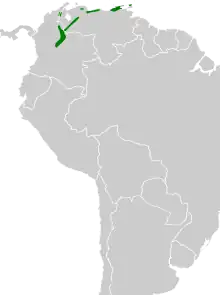Stripe-breasted spinetail
The stripe-breasted spinetail (Synallaxis cinnamomea) is a passerine bird found in the tropical New World in Trinidad, Tobago, Colombia and Venezuela. This species is a fairly common resident breeder in hill forest, and in Tobago also occurs in lowland and scrub habitats.
| Stripe-breasted spinetail | |
|---|---|
.jpg.webp) | |
| Scientific classification | |
| Domain: | Eukaryota |
| Kingdom: | Animalia |
| Phylum: | Chordata |
| Clade: | Dinosauria |
| Class: | Aves |
| Order: | Passeriformes |
| Family: | Furnariidae |
| Genus: | Synallaxis |
| Species: | S. cinnamomea |
| Binomial name | |
| Synallaxis cinnamomea Lafresnaye, 1843 | |
 | |
It is a member of the South American bird family Furnariidae, a group in which many species build elaborate clay nests, giving rise to the English name for the family of "ovenbirds".
However, stripe-breasted spinetail constructs a spherical stick nest with a tubular entrance low in a bush, into which its two greenish white eggs are laid.
The stripe-breasted spinetail is typically 14 cm long, and weighs 16 g. It is a slender bird with a longish tail. The upperparts and head are dark brown, and the wings are chestnut. The throat is white streaked with black, and the rest of the underparts are dark-streaked buff.
The sexes are similar, but there are several races. S. c. aveledoi is paler, S. c. striatipectus is darker and S. c. bolivari is whiter with a less streaked throat. The Tobago form S. c. terrestrisi is large and pale, and S. c. carri on Trinidad is dark and lightly streaked.
Stripe-breasted spinetail is an insectivore which is often difficult to see as it forages in undergrowth, but may be located by its calls, a querulous chew or a high-pitched nasal keep gcing.
References
- BirdLife International (2018). "Synallaxis cinnamomea". IUCN Red List of Threatened Species. 2018: e.T22702381A130273844. doi:10.2305/IUCN.UK.2018-2.RLTS.T22702381A130273844.en. Retrieved 12 November 2021.
